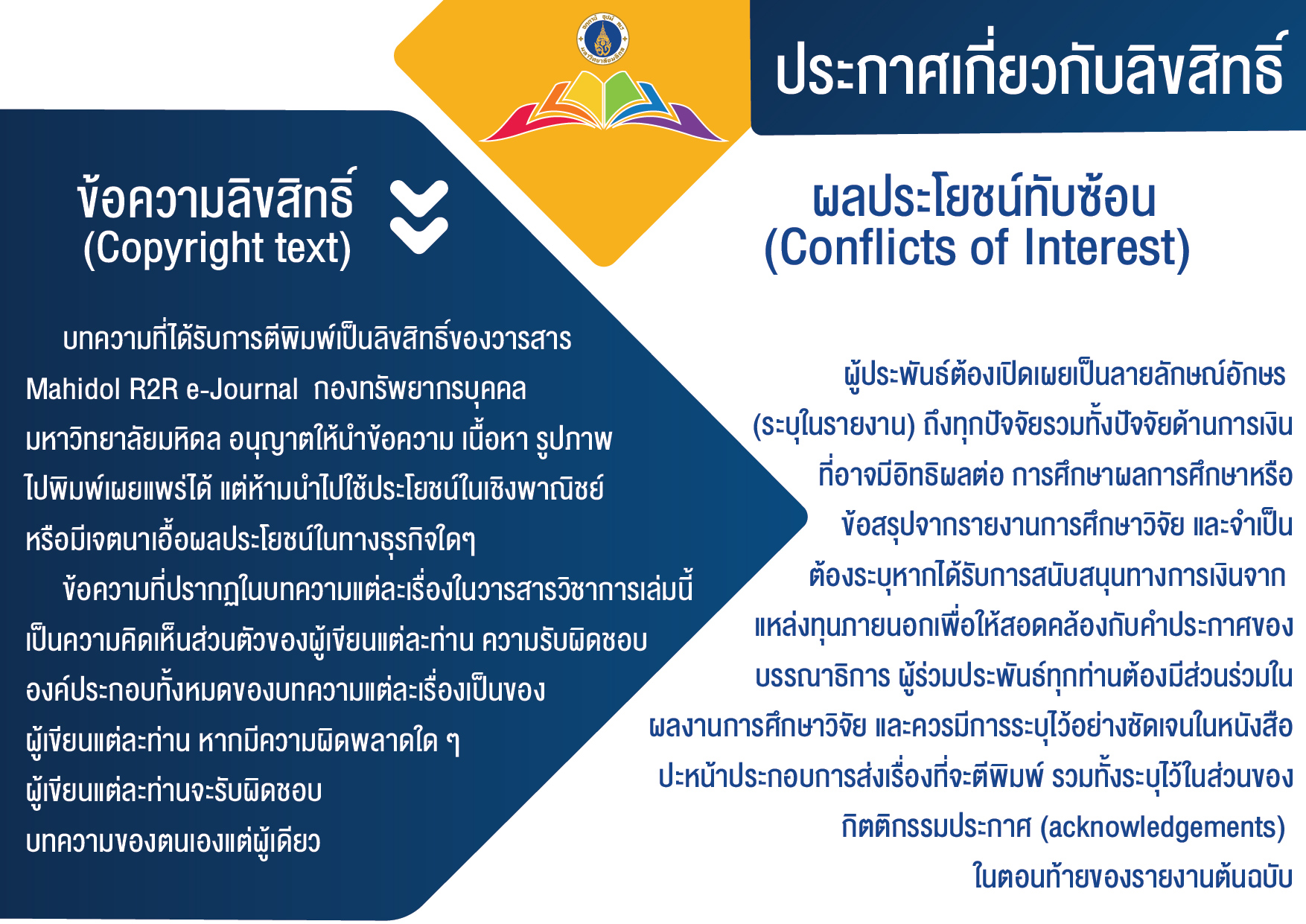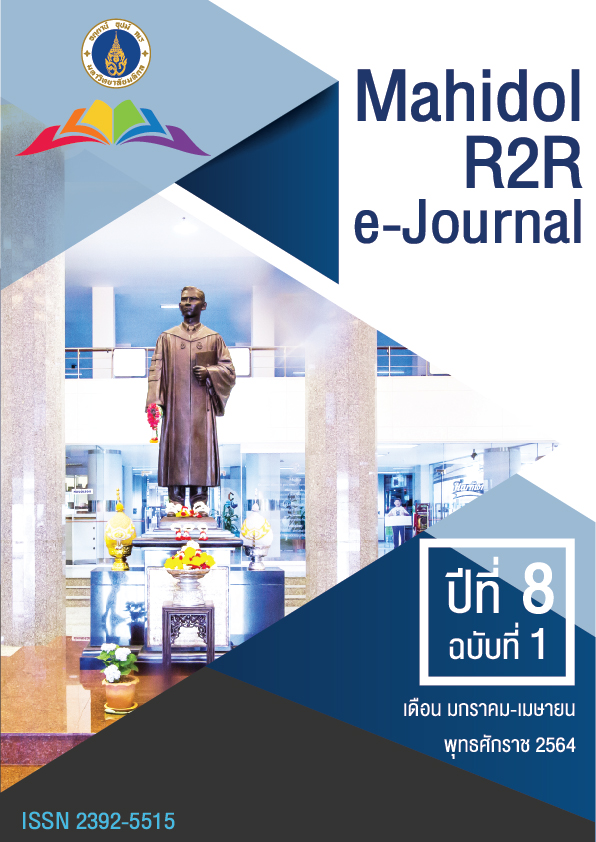การพัฒนาธุรกิจฐานชุมชนในเขตปฏิรูปที่ดินภายใต้กระบวนการส่งเสริมการเกษตรของสำนักงานการปฏิรูปที่ดินเพื่อเกษตรกรรม (ส.ป.ก.)
DOI:
https://doi.org/10.14456/jmu.2021.11คำสำคัญ:
งานวิจัยสู่งานประจำ, ธุรกิจฐานชุมชน, เขตปฏิรูปที่ดินบทคัดย่อ
วัตถุประสงค์การศึกษานี้เพื่อถอดบทเรียน และศึกษาผลการพัฒนาธุรกิจฐานชุมชนจากงานวิจัยสู่งานประจำในการพัฒนาธุรกิจฐานชุมชนในเขตปฏิรูปที่ดิน โดยออกแบบกระบวนการพัฒนาเจ้าหน้าที่ส่งเสริมการเกษตรของสำนักงานการปฏิรูปที่ดินเพื่อเกษตรกรรม (ส.ป.ก.) ในการพัฒนากลุ่มเกษตรกรเป้าหมาย ผลการศึกษาพบว่า 1. กระบวนการพัฒนางานวิจัยสู่การพัฒนาธุรกิจฐานชุมชนในเขตปฏิรูปที่ดิน ได้กระบวนการดำเนินงาน 9 ขั้นตอน ได้แก่ 1) กำหนดเป้าหมายเพื่อการพัฒนาธุรกิจฐานชุมชน 2) วางแผนและกำหนดวิธีการ/เครื่องมือ 3) ประชุมกลุ่มแกนนำเป้าหมายและเก็บข้อมูล 4) วิเคราะห์ชุมชนโดยการมีส่วนร่วม 5) ค้นหาศักยภาพด้านการผลิต การตลาดและการบริหารจัดการ 6) คืนข้อมูลชุมชนและตั้งเป้าหมายธุรกิจฐานชุมชน 7) สร้างการเรียนรู้เรื่องธุรกิจฐานชุมชน 8) จัดทำแผนธุรกิจฐานชุมชน 9) ดำเนินธุรกิจฐานชุมชน และ 2.ผลการพัฒนาธุรกิจฐานชุมชน ได้แก่ 1) กลุ่มเกษตรกรเป้าหมาย เกิดแผนธุรกิจฐานชุมชน 5 แผน ได้แก่ จังหวัดสกลนครเกิดแผนธุรกิจข้าวอินทรีย์ นครราชสีมาเกิดแผนธุรกิจการท่องเที่ยวการเกษตร พระนครศรีอยุธยาเกิดแผนธุรกิจการผลิตข้าวเพื่อบริโภค ชุมพรเกิดแผนธุรกิจกล้วยหอมทองสด และภูเก็ตเกิดแผนธุรกิจการผลิตและแปรรูปผักพื้นบ้าน 2) ผลที่เกิดขึ้นกับการดำเนินงานของเจ้าหน้าที่ ทำให้สามารถออกแบบการดำเนินงานตามนโยบายการพัฒนาภาคการเกษตรอย่างเป็นระบบ และใช้กระบวนการวิจัยเป็นเครื่องมือในการพัฒนาการเกษตร
เอกสารอ้างอิง
จุฑาทิพย์ ภัทราวาท. (2556). การวิจัยการขับเคลื่อนการพัฒนาการสหกรณ์และการค้าที่เป็นธรรม ระยะที่ 6 (รายงานผลการวิจัย). กรุงเทพฯ: สำนักงานกองทุนสนับสนุนการวิจัย (สกว.)
วินัย เมฆดำ และวิทเอก สว่างจิตร. (2558). การพัฒนาระบบส่งเสริมเรียนรู้เพื่อยกระดับสมรรถนะการแข่งขันผ่านกลไกหน่วยงานรัฐ ปีที่ 1 (รายงานผลการวิจัย). กรุงเทพฯ: สำนักงานกองทุนสนับสนุนการวิจัย (สกว.)
วินัย เมฆดำ และวิทเอก สว่างจิตร. (2559). การพัฒนาระบบส่งเสริมเรียนรู้เพื่อยกระดับสมรรถนะการแข่งขันผ่านกลไกหน่วยงานรัฐ ปีที่ 2 (รายงานผลการวิจัย). กรุงเทพฯ: สำนักงานกองทุนสนับสนุนการวิจัย (สกว.)
จัด 4 หลักสูตร Smart Offier มุ่งนักส่งเสริมเกษตรสู่มืออาชีพ. (7 กันยายน 2559). คมชัดลึกออนไลน์. สืบค้นจาก https://www.komchadluek.net/ news/ agricultural/241052
สถาบันวิจัยระบบสาธารณสุข (2555). เคล็ดไม่ลับคุณอำนวย ฟันเฟืองขับเคลื่อน R2R เล่ม 2. กรุงเทพฯ: มหาวิทยาลัยมหิดล.
กรมส่งเสริมการเกษตร. (2556). ถอดรหัสงานประจำนำสู่งานวิจัย. กองวิจัยและพัฒนางานส่งเสริมการเกษตร.
จิตรลดา อมรวัฒนา. (2560). เอกสารประกอบโครงการฝึกอบรมหลักสูตรการพัฒนากระบวนการปฏิบัติงานประจำสู่งานวิจัย. (Routine to Research: R2R). กรุงเทพฯ: วันที่ 23-24 กุมภาพันธ์ 2560.
สุวิชชา เทพลาวัลย์และภวรัญชน์ กัญญาคำ.(2563). ผลการสำรวจงานวิจัยประเภท (Routine to Research (R2R)และการนำผลงานวิจัยไปใช้ประโยชน์ในคณะแพทยศาสตร์โรงพยาบาลรามาธิบดี มหาวิทยาลัยมหิดล. วารสารการพัฒนางานประจำสู่งานวิจัย (ปีที่ 7 มกราคม–มิถุนายน 2563): 23-23.
ยุทธดนัย สีดาหล้า. (2550). ถอดบทเรียนไม่ยากอย่างที่คิด. สืบค้น 26 กรกฎาคม 2562. จากhttp://newsser.fda.moph.go.th/rumthai/userfiledownload/asu96dl.pdf
อุทัยทิพย์ เจี่ยวิวรรธน์กุล. (2554). กิจกรรมถอดบทเรียนจากแนวคิดสู่การปฏิบัติ. สืบค้น 26 กรกฎาคม 2562. จาก http://www.elearning.ns. mahidol.ac.th/km/index.php/กิจกรรม-lo-km
ศุภวัลย์ พลายน้อย. (2556). นานาวิธีวิทยาการถอดบทเรียนและสังเคราะห์องค์ความรู้. พิมพ์ครั้งที่ 6. กรุงเทพฯ: บริษัท พี.เอ.ลิฟวิ่ง จำกัด.
เลขา ปิยะอัจฉริยะและคณะ. (2560). โครงการ “การวิเคราะห์กระบวนการจัดการเรียนรู้ตามแนวคิด RBL ในสถานศึกษาภายใต้โครงการเพาะพันธุ์ปัญญา”. กรุงเทพฯ: สำนักงานกองทุนสนับสนุนการวิจัย.
ดาวน์โหลด
เผยแพร่แล้ว
ฉบับ
ประเภทบทความ
สัญญาอนุญาต




